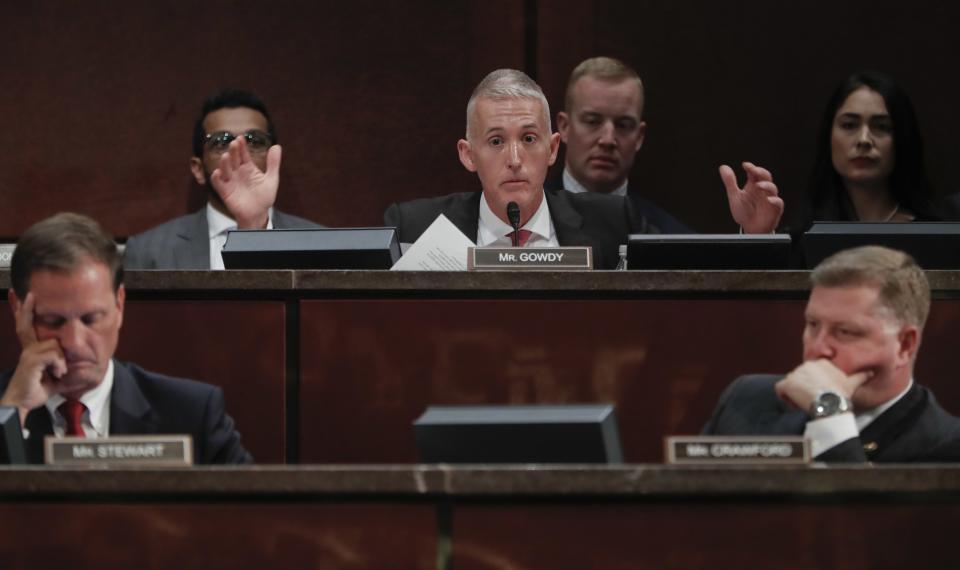Ex-CIA chief Brennan describes warning Kremlin to cut the dirty tricks — to no avail
Former CIA Director John Brennan was so disturbed by Russian “active measures” against the United States last summer — including meddling in the presidential election — that he issued a stern warning to his counterpart in the Kremlin, Alexander Bortnikov, director of the Russian FSB.
Russian efforts to interfere in the U.S. would “backfire” and Americans “would be outraged,” destroying any hopes for improvements in U.S.-Russian relations, Brennan warned Bortnikov in a phone call on Aug. 4. The FSB chief, Brennan said, did what the Russians typically do — deny the allegations and blame the U.S. for concocting them — although he did promise to pass along the message to his boss, Vladimir Putin.
But the bottom line on Brennan’s testimony is that his attempt to call out the Kremlin, which was coordinated with the White House, fizzled. The “influence campaign” by Putin’s government and its surrogates to meddle in the U.S. election continued unabated. The first dump of emails stolen from the Gmail account of Hillary Clinton Campaign Manager John Podesta was made by WikiLeaks on Oct. 7 — more than two months after Brennan had told Bortnikov to cut it out.
“It was all bark and no bite,” said Heather Conley, the director of Europe and Eurasia affairs for the Center for Strategic and International Studies, about Brennan’s phone call with Bortnikov. “Not only did [Russian meddling] not stop, it kept on going — there was a complete intensification.”

Brennan’s public testimony — his first since leaving office on Jan. 20 — came as investigations are accelerating into Russian meddling in the election and possible links to the Trump campaign. And Brennan tossed some new fuel on that fire, telling the committee that he saw intelligence that revealed “contacts and interactions between Russian officials and U.S. persons involved in the Trump campaign that I was concerned about.” By the time he left office, he said at another point, “I had unresolved questions in my mind as to whether or not the Russians had been successful in getting U.S. persons, involved in the campaign or not, to work on their behalf, again, either in a witting or unwitting fashion.”
But Brennan’s comments in the public session did little to clarify whether those questions were ever resolved, or if he found evidence of actual collusion between Moscow and the Trump campaign. Republicans on the panel repeatedly hammered away on this point, prompting Brennan to say a couple of times that, as an intelligence officer, “I don’t do evidence.”
Rep. Trey Gowdy, R-S.C., was having none of it. “I appreciate that you don’t do evidence, Director Brennan. Unfortunately, that’s what I do. That’s the word we use.” He pressed again: “Did evidence exist of collusion, coordination, conspiracy, between the Trump campaign and Russian state actors at the time you learned of 2016 efforts?”
“I don’t know whether or not such collusion — and that’s your term — such collusion existed,” Brennan replied. “I don’t know. But I know that there was a sufficient basis of information and intelligence that required further investigation by the [FBI] to determine whether or not U.S. persons were actively conspiring, colluding with Russian officials.”
Later in the day the committee heard testimony from Brennan in a closed-door, classified session, where he may have revealed more.
With the appointment of former FBI Director Robert Mueller as the special counsel for the Russia probe, and the disclosure that President Trump tried to get two top U.S. intelligence officials to clear his campaign of collusion, the probes are taking off in new, more serious directions, raising the prospect that administration officials may be under investigation for obstruction of justice.

But Brennan’s phone call to Bortnikov puts the spotlight on the Obama administration’s failure to more effectively counter Russian interference as it was taking place. The Obama White House took no formal action until its final weeks — on Dec. 29, when it imposed new sanctions against Russian officials and entities (including Bortnikov’s FSB and the military intelligence service known as the GRU) and evicted 35 suspected Russian intelligence operatives.
But that was too little — and far too late, according to Conley. When Brennan called to warn Bortnikov, the message had to be echoed “across the government” and “there had to be meaningful consequences,” she said.
Read more from Yahoo News:
‘The most horrible feeling’: Mother of missing Manchester concertgoer describes chaos of attack
Pentagon report shows Flynn misled investigators about Russia trip
‘Operation Git-Meow’: The mission to save Gitmo’s feral cats
As Iraqi forces close in on ISIS and Mosul, civilians are still caught in the crossfire
Photos: Deadly blast at Ariana Grande concert in Manchester, England



